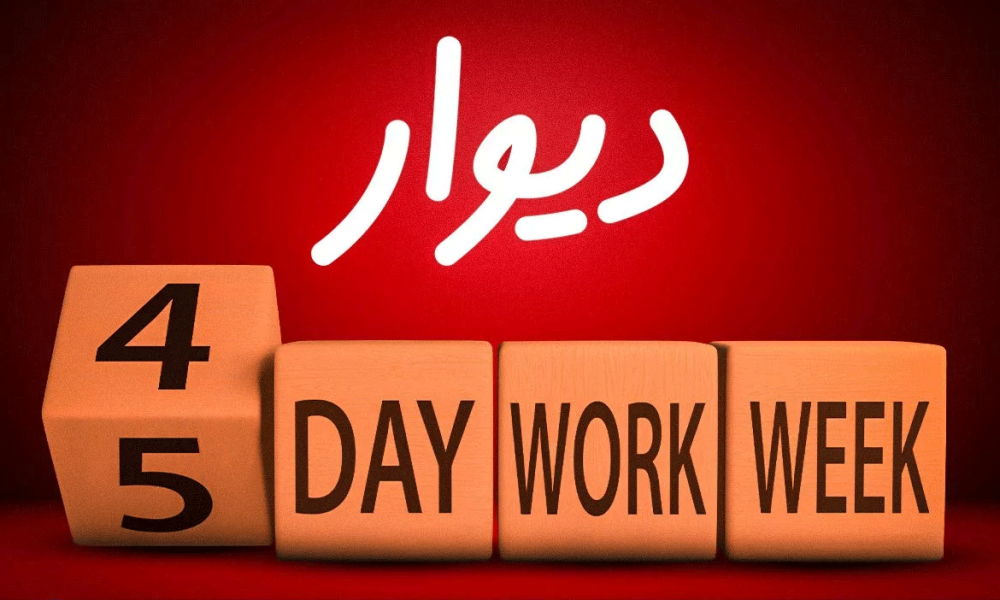Since the beginning of August, Divar company has implemented a one-month four-day work week as a trial. Once the results of this test are known, the company’s managers will decide on the next steps.
According to Iran digital economy annotation, Divar measured the results of the plan by conducting two surveys before the implementation of the four-day working week trial plan and in the last days of this plan.
In these surveys, the status of changes in the 3 topics of “work-life balance”, “communications” and “meetings” before and after the four-day work week model was asked in the form of 4 or 5 questions, and the audience should choose the options “I do not agree at all”. , “Somewhat disagree” (unfavorability), “Somewhat agree” and “Completely agree” (favorability) as well as “I have no opinion” answered the questions. The results showed that in all 3 cases, the percentage of favorability has grown and the percentage of unfavorability has decreased.
Based on this, a 15% increase in favorability and a 13% decrease in unfavorability were observed in the issue of work-life coordination. In the subject of communication, a 9% increase in favorability and an 8% decrease in unfavorability, and in the subject of meetings, a 5% increase in favorability and a 6% decrease in unfavorability were recorded.
Negative and positive points
The conducted surveys showed that the managers of the teams in Divar had things like a better balance between work and life, more concentration and productivity, more opportunity for ideation and thinking, stress reduction, increased flexibility and improved quality of life, and increased creativity, among other positive results Implementation of this proposed experimental plan they do.
Of course, the four-day working week plan has also had negative results. According to the managers of the teams, increasing the volume of work on working days, worrying about not getting to work, reducing inter-team interactions, problems in communicating with other teams, the need for more time to get used to it and increasing stress due to the lack of benchmarks are the negative effects of experiencing a four-day work week in Divar.
At the same time, the team members also had almost similar opinions about the positive and negative results of the implementation of this plan. In addition to the things that their managers had raised as positive points, the team members raised things such as more opportunities for ideation and learning, optimization of time and deep work, and a positive effect on mental and physical health. According to them, the negative results included things like feeling underworked or needing to work on a holiday, feeling of not being in harmony with other companies and departments, stress caused by adapting to the new model, and problems in time management and planning.
Plan’s limitations
Hossein Ansari, the deputy engineer of Divar, considers it a difficult task to measure the success of this project and says: “The project deals with manpower and productivity, and determining the criteria for such issues was not an easy task. Of course, we have standard metrics such as Dora Metrics for DevOps, which we controlled and monitored, and we measured things like job satisfaction, sense of work-life balance, participation, and the like through surveys.”
He adds: “2 polls; One was held at the end of July and the second at the end of September this year, and the comparison of their results showed that colleagues feel more harmonious between their work and private life in the four-day week, their motivation and energy have increased, and the meetings have become more productive.
Ansari also says about the limitations of this experiment: “The first point was that not all organizations could participate in the plan; The legal, headquarters and executive teams were required to work as usual to meet the SLA and necessary external communications, and in this way, they felt unfair.
The deputy engineer of Divar continues: “During the implementation of the plan, the middle managers were worried about whether they would reach the set indicators or not, and this issue put pressure and stress on them.”
Stating that new ideas are regularly tested at Divar and the four-day work week plan was one of these experiments, he adds: “Divar has other tools for creating work flexibility at the disposal of managers; For example, the amount of leave is unlimited and people can use any amount of leave in coordination with the team. Also, we don’t have clocks on the wall, and as long as productivity is ensured, we can have flexible working hours.”
Proposal to implement the plan in the summer of every year
Ansari says: “Ultimately, the decision to implement a four-day work week permanently or not rests with the management. But we have also put forward recommendations; including that there are no meetings on Saturdays or that the four-day working week plan is implemented at least in the summers.”
Divar’s attention to large language models
Emphasizing that in order to increase productivity and efficiency, the use of large language models on Divar is of special interest, he adds: “Our vision is that every task in the organization that can be replaced with LLM , this replacement will be done. Of course, there is a need for human supervision in many tasks to maintain the accuracy of performance, but we predict that due to the rapid development of technology, autonomous systems can be used in this field in the future.”




No Comment! Be the first one.